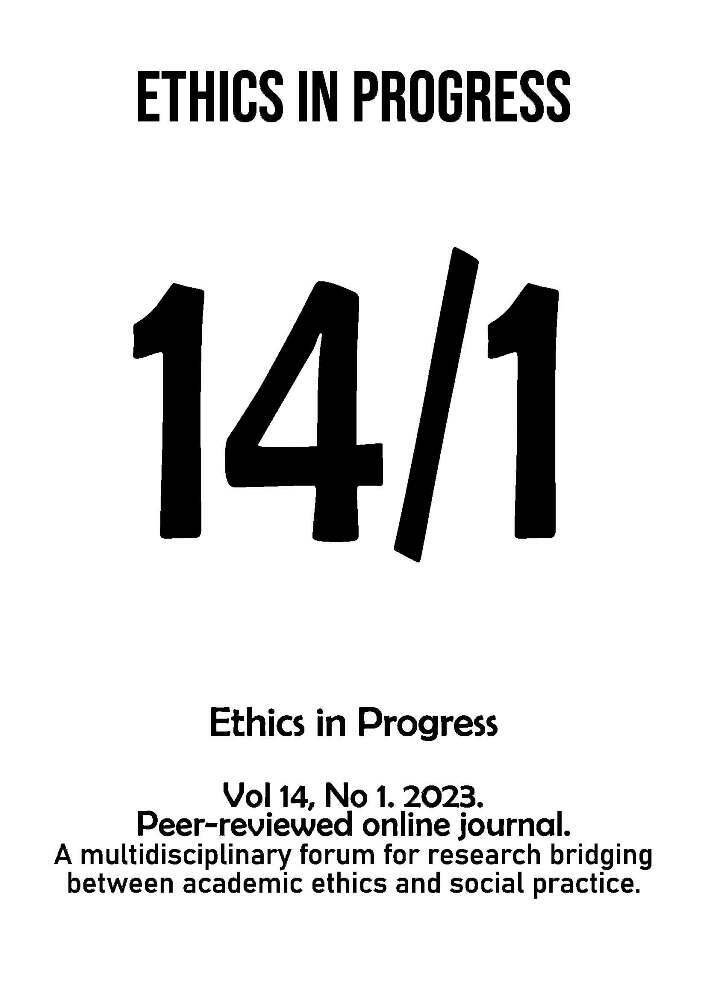Abstract
The main aim of this paper is to propose the inclusion of the expertise of a prudent agent within the procedure of reflective equilibrium by adding a disposition for identifying reasonable beliefs. This can be seen as the starting point of the method, and would safeguard against the criticism of conservatism and subjectivism. In order to do this, I will begin by analyzing the core characteristics of the method and its main weaknesses. I will then investigate the characteristics of prudence as a disposition for identifying an adequate means for achieving a good end. With this in mind, I will apply prudence to the procedure which is carried out by an agent who deliberates well and can identify reasonable moral beliefs. These beliefs must be justified according to their consistency with ethical principles and with the factual beliefs of relevant scientific theories. Finally, I will argue that this deliberative process is consistent with ethical pluralism and democracy, and can be interpreted as a kind of moral knowledge.
References
Annas J. 2011. Intelligent Virtue. Oxford: Oxford University Press. DOI: https://doi.org/10.1093/acprof:oso/9780199228782.001.0001
Aquinas T. 1981. Summa Theologica. Trans. by the Fathers of the Dominican Province. Christian Classics.
Aristotle. 1999. Nicomachean Ethics. 2nd Edition, trans. by T. Irwin. Indianapolis, Indiana: Hackett Publishing Company. DOI: https://doi.org/10.1093/oseo/instance.00258595
Brandt R. 1979. A Theory of the Good and the Right. Oxford: Oxford University Press.
Carr D. 2020. “Knowledge and Truth in Virtuous Deliberation,” Philosophia 48:1381–1396. DOI: https://doi.org/10.1007/s11406-020-00179-5
Copp D. 1985. “Considered Judgments and Justification: Conservatism in Moral Theory,” in D. Copp & M. Zimmerman (Eds.), Morality, Reason, and Truth (pp. 141–169). Totowa, NJ: Rowman & Allenheld.
Daniels N. 1979. “Wide Reflective Equilibrium and Theory Acceptance in Ethics,” The Journal of Philosophy 76(5):256–282. DOI: https://doi.org/10.2307/2025881
DePaul M. 2006. “Intuitions in Moral Inquiry,” in D. Copp (Ed.), The Oxford Handbook of Ethical Theory (pp. 595–623)). Oxford: Oxford University Press. DOI: https://doi.org/10.1093/0195147790.003.0022
Ebertz R. 1993. “Is Reflective Equilibrium a Coherentist Model?” Canadian Journal of Philosophy 23(2):193–214. DOI: https://doi.org/10.1080/00455091.1993.10717317
Gettier E. 1963. “Is Justified True Belief Knowledge?” Analysis 23(6):121–123. DOI: https://doi.org/10.1093/analys/23.6.121
Hare R. 1973. “Rawls’ Theory of Justice,” Philosophical Quarterly 23:144–155. DOI: https://doi.org/10.2307/2217486
Hursthouse R. 1997. “Virtue Theory and Abortion,” in R. Crisp & M. Slote (Eds.), Virtue Ethics (pp. 217-238). Oxford: Oxford University Press. DOI: https://doi.org/10.1515/9781474472845-016
Hursthouse R. 2006. “Practical Wisdom: A Mundane Account,” Proceedings of the Aristotelian Society 106(3):283-307. DOI: https://doi.org/10.1111/j.1467-9264.2006.00198.x
Kelly T. & McGrath S. 2010. “Is Reflective Equilibrium Enough?” Philosophical Perspectives 24(1):325–359. DOI: https://doi.org/10.1111/j.1520-8583.2010.00195.x
Lyons D. 1975. “Nature and Soundness of the Contract and Coherence Arguments,” in N. Daniels (Ed.), Reading Rawls (pp. 141–167). New York: Basic Books.
Rawls J. 1971. A Theory of Justice. Original Edition. Cambridge, MA: Harvard University Press. DOI: https://doi.org/10.4159/9780674042605
Rawls J. 1975. “The Independence of Moral Theory,” Proceedings and Addresses of the American Philosophical Association 48:5–22. DOI: https://doi.org/10.2307/3129858
Rawls J. 2001. Justice as Fairness: A Restatement. Ed. by E. Kelly. Cambridge, MA: Harvard University Press. DOI: https://doi.org/10.2307/j.ctv31xf5v0
Roberts R. C. & Wood W. J. (Eds.). 2009. Intellectual Virtues: An Essay in Regulative Epistemology. New York: Oxford University Press.
Scanlon T. 1998. What We Owe to Each Other. Cambridge, MA: Harvard University Press.
Scanlon T. 2003. “Rawls on Justification,” in N. Freeman (Ed.), The Cambridge Companion to Rawls (pp. 139–167). Cambridge: Cambridge University Press. DOI: https://doi.org/10.1017/CCOL0521651670.004
Scanlon T. 2014. Being Realistic about Reasons. Cambridge, MA: Harvard University Press. DOI: https://doi.org/10.1093/acprof:oso/9780199678488.001.0001
Siegel H. 1992. “Justification by Balance,” Philosophical and Phenomenological Research LII(1):27–46. DOI: https://doi.org/10.2307/2107742
Singer P. 1974. “Sidgwick and Reflective Equilibrium,” Monist 58(3):490–517. DOI: https://doi.org/10.5840/monist197458330
Sosa E. 2011. Reflective Knowledge: Apt Belief and Reflective Knowledge, Vol. II. Oxford: Oxford University Press.
Zagzebski L. 1996. Virtues of the Mind: An Inquiry into the Nature of Virtue and Ethical Foundations of Knowledge. Cambridge: Cambridge University Press. DOI: https://doi.org/10.1017/CBO9781139174763
Walden K. 2013. “In Defense of Reflective Equilibrium,” Philosophical Studies 166(2):243–256. DOI: https://doi.org/10.1007/s11098-012-0025-2
License

This work is licensed under a Creative Commons Attribution-ShareAlike 4.0 International License.





